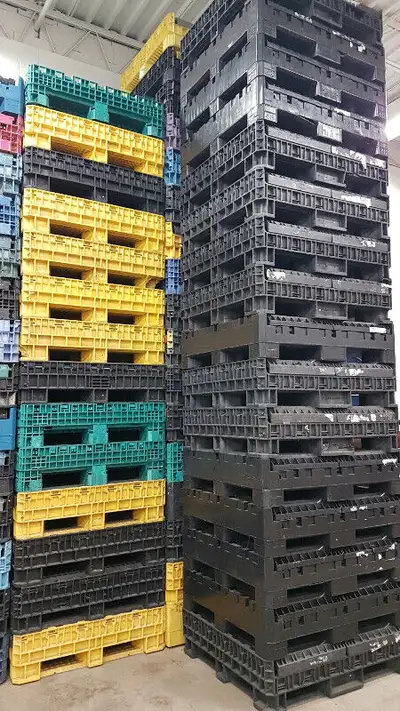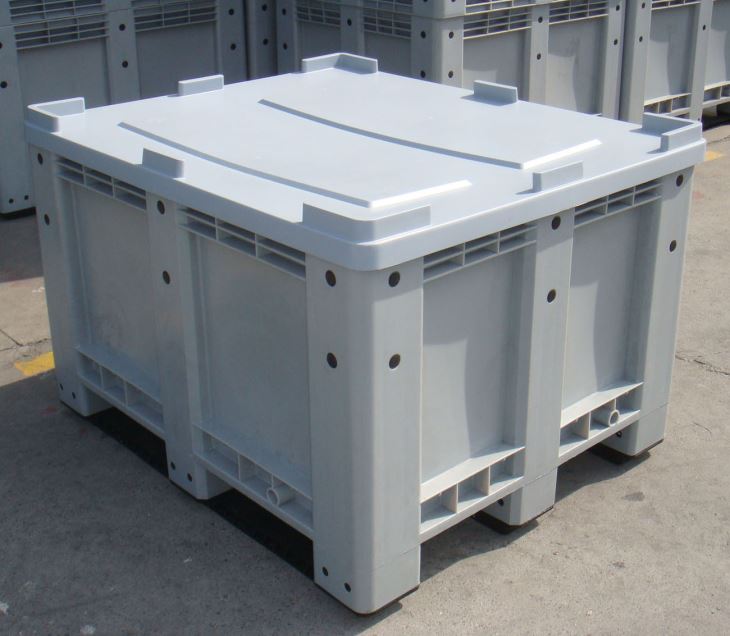Why Bulk Containers Are Important for Lasting and Economical Transportation
Mass containers play a necessary duty in modern logistics. They promote the efficient activity of huge quantities of products, consequently enhancing transportation procedures. This approach not only minimizes costs but likewise decreases environmental influence via reduced discharges and waste generation. As industries look for even more lasting techniques, the fostering of mass containers is ending up being increasingly significant. What effects does this shift hold for future logistics and supply chain administration?

The Benefits of Making Use Of Bulk Containers in Logistics
Mass containers transform logistics by enhancing performance and sustainability. These containers enable the transportation of large amounts of items in a single trip, markedly minimizing the variety of journeys needed. This not only enhances operations however likewise decreases labor costs associated with handling, packing, and unloading. On top of that, mass containers are designed to optimize space application within transportation automobiles, making certain that even more products can be delivered simultaneously.
The standardization of mass containers also simplifies the logistics procedure. With uniform dimensions, they can be quickly piled and saved, resulting in enhanced warehouse monitoring. Additionally, mass containers usually include durable materials that shield components from damages throughout transportation, thereby lowering item loss and enhancing total dependability. As an outcome, companies can experience improved supply chain efficiency, eventually causing boosted profitability and customer fulfillment. This mix of aspects makes bulk containers a crucial possession in modern-day logistics.
Ecological Influence: Minimizing Waste and Carbon Impact
As industries significantly prioritize sustainability, the adoption of mass containers has actually become a key method for minimizing waste and reducing carbon footprints. These containers reduce the use of product packaging materials, such as boxes and plastic, therefore significantly reducing overall waste generation. By combining deliveries, mass containers boost transportation performance, permitting more items to be delivered per trip. This reduction in journeys straight associates with lower greenhouse gas emissions, adding to a smaller carbon footprint.
Furthermore, bulk containers can typically be recycled or reused, additionally mitigating environmental influence. The longevity of these containers assurances they can hold up against several transportation cycles, reducing the demand for single-use choices. used collapsible containers. By improving logistics and promoting effective source use, bulk containers not only sustain sustainable methods but likewise urge sectors to straighten with international environmental goals. Ultimately, their application shows a dedication to ecological stewardship and responsible resource monitoring
Price Cost Savings: Just How Mass Containers Lower Transport Costs
While numerous firms look for methods to improve their profits, making use of mass containers offers a significant possibility for lowering transport expenses. Bulk containers make the most of the quantity of items moved, allowing organizations to deliver bigger quantities simultaneously. This performance minimizes the variety of trips required, directly reducing fuel expenses and decreasing labor expenses connected with loading and unloading.
In addition, mass containers frequently include structured designs that maximize room use within transportation lorries. This indicates less empty rooms, resulting in more efficient usage of offered ability. The longevity of mass containers can lower the danger of item damage throughout transit, making sure and decreasing losses that more products arrive undamaged.
Enhancing Supply Chain Performance With Bulk Storage Space Solutions
Mass storage services play a vital function in enhancing supply chain performance by optimizing stock monitoring. By settling items right into fewer, larger containers, companies can greatly minimize managing costs linked with frequent transfers and processing. This structured technique permits much better tracking and monitoring of supply, eventually bring about enhanced operational efficiency.
Streamlined Supply Monitoring
Efficient supply monitoring is vital for optimizing supply chain procedures, especially when companies embrace bulk storage options. These solutions enable services to maintain greater stock degrees while reducing the frequency of replenishment. By combining materials right into mass containers, companies can improve their supply processes, reducing the intricacy connected with tracking multiple smaller sized bundles. This technique helps with precise supply counts and improves projecting precision, permitting even more enlightened decision-making. In addition, mass storage space solutions simplify storage facility organization, making it much easier to find and access products when needed. Consequently, companies can attain a much more reliable inventory turnover rate, inevitably enhancing total supply chain performance and minimizing the likelihood of stockouts or overstock scenarios.

Lowered Handling Costs
The implementation of mass storage remedies not just simplifies supply administration but also significantly decreases taking care of prices across the supply chain. By consolidating products into bulk containers, companies lessen the demand for constant handling and transfer in between different storage space and transport devices. This method minimizes labor costs linked with loading, dumping, and moving smaller packages. In addition, mass storage space lowers the frequency of shipments, causing lower transport expenses and reduced gas intake. Because of this, companies can maximize their logistics procedures, enabling a more effective allotment of sources. Inevitably, lowered handling costs contribute to boosted general supply chain effectiveness, cultivating a setting that sustains both sustainability and financial stability.

Convenience of Mass Containers Throughout Numerous Industries
Although several markets have unique needs for transportation and storage, bulk containers have emerged as a versatile option that satisfies a variety of needs. These containers, ranging from huge bins to specialized storage tanks, can suit diverse materials, including granules, powders, and liquids. In the agricultural industry, mass containers help with the transport of grains and plant foods, while the food and beverage industry utilizes them for components and ended up products. The chemical industry depends on mass containers for safely transporting unsafe materials, making sure conformity with safety and security policies. In addition, building companies take advantage of mass containers for moving aggregates and various other materials. Their versatility reaches various settings of transportation, consisting of trucks, trains, and ships, boosting logistical performance. This flexibility not only enhances procedures across different sectors yet additionally promotes sustainability by lowering packaging waste and maximizing space in transportation. Consequently, bulk containers play an essential role in modern-day supply chain monitoring.
Future Patterns in Mass Container Use and Sustainability
The future of bulk container usage is increasingly shaped by innovative products development that enhances sustainability. Furthermore, automation in logistics assures to improve operations, reducing waste and improving performance. Welcoming circular economy techniques will certainly even more transform just how bulk containers are created, utilized, and recycled, promoting a more lasting transport landscape.
Ingenious Materials Development
As industries progressively prioritize sustainability, ingenious products development in bulk containers becomes a considerable consider boosting green transportation options. Manufacturers and researchers are discovering naturally degradable plastics, recycled compounds, and light-weight steels to reduce environmental influence. These products not just decrease waste yet likewise improve gas effectiveness by lowering the total weight of containers. Furthermore, improvements in smart materials, which can adjust to differing conditions, improve the sturdiness and functionality of mass containers. The combination of these cutting-edge materials straightens with round economic climate principles, promoting reuse and recycling. As the demand for lasting techniques expands, the advancement of such products will play a crucial function in forming the future of mass container use in logistics and transportation.
Automation in Logistics
Significant advancements in automation are positioned to transform logistics and the application of bulk containers, enhancing sustainability in transport. Automated systems, including drones and autonomous cars, are improving the activity of bulk containers, decreasing the dependence on conventional fuel-powered transportation. These modern technologies optimize routing and filling processes, reducing vacant miles and improving fuel efficiency. Furthermore, automated stock administration systems enhance monitoring and tracking of bulk containers, making certain better source appropriation and minimized waste. The combination of the Internet of Points (IoT) enables real-time data analysis, enabling aggressive decision-making that straightens with sustainability goals. As automation continues to develop, it is expected to drive even more technologies wholesale container use, ultimately supporting even more sustainable logistics methods and decreasing the environmental effect of transport.
Circular Economic Situation Practices
Improvements in automation are establishing the phase for a much more integrated strategy to round economy methods in the domain of bulk container use. As sectors progressively welcome sustainability, bulk containers are being created used collapsible bulk containers for long life and reusability. This change not only lessens waste however likewise enhances source performance. Business are adopting techniques such as closed-loop systems, where used containers are collected, reconditioned, and reintroduced right into the supply chain. In addition, clever modern technologies track container life cycles, helping with far better monitoring and minimizing environmental effect. The collaboration in between makers, logistics providers, and end-users is essential in establishing criteria for sustainable container usage. refurbished bulk containers. Future trends suggest a growing focus on products that are naturally degradable and recyclable, additional strengthening the circular economic situation's principles in bulk transport
-400x300.webp)
Often Asked Concerns
What Materials Are Bulk Containers Usually Made From?
Mass containers are usually constructed from durable materials such as high-density polyethylene, cardboard, steel, and light weight aluminum. These products supply stamina, protection, and adaptability, making them ideal for carrying different goods in various markets efficiently.
Just how Do I Pick the Right Dimension Bulk Container?
Picking the best dimension mass container includes examining the quantity of products to be delivered, thinking about taking care of tools compatibility, and assessing storage room needs. Proper dimension assurances effectiveness in transportation and reduces waste throughout delivery.
Are Mass Containers Reusable or Recyclable?
Mass containers are commonly multiple-use, developed for multiple journeys, enhancing sustainability. Numerous can additionally be recycled, relying on the materials made use of. Choosing recyclable choices further reduces and supports environmental goals waste in transportation practices.
What Security Rules Apply to Bulk Container Transport?
Safety policies for bulk container transportation consist of compliance with the Department of Transportation standards, proper labeling of dangerous products, architectural honesty assessments, and adherence to weight limits to assure safe handling and avoid mishaps throughout transportation.
Just How Can Companies Transition to Using Bulk Containers Successfully?
Companies can alter to bulk containers by examining existing logistics, educating personnel on handling, purchasing ideal devices, maximizing stock monitoring, and working together with vendors to guarantee compatibility and efficiency throughout the supply chain.
As industries increasingly focus on sustainability, the fostering of bulk containers has emerged as an essential technique for reducing waste and decreasing carbon footprints. By consolidating products right into bulk containers, business can simplify their inventory procedures, decreasing the intricacy associated with tracking several smaller packages. As markets increasingly focus on sustainability, innovative materials advancement in mass containers arises as a considerable aspect in enhancing environmentally friendly transportation remedies. Automated systems, consisting of drones and autonomous lorries, are simplifying the motion of mass containers, reducing the dependence on conventional fuel-powered transportation. Furthermore, automated inventory monitoring systems improve monitoring and tracking of mass containers, making certain better resource allowance and lowered waste.